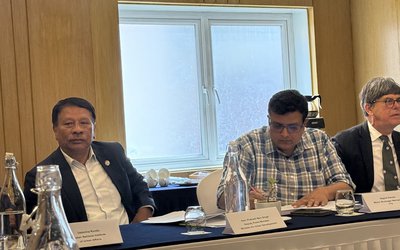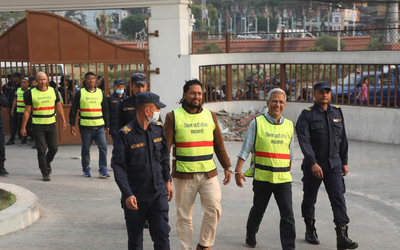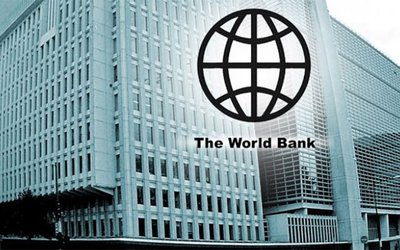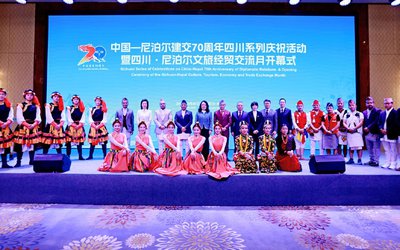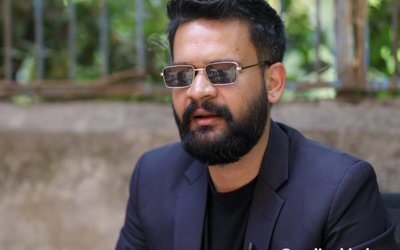
The outstanding bravery and sacrifice of Bhakti Thapa during the Anglo-Nepal War has completely overshadowed the equally most crucial role he played in making Nepal a South Asian formidable power.
According to foreign historians Bhakti Thapa had created a legend of the bravest of the braves during the Anglo-Nepal War. A wave site in the USA has even identified him as one of the world's 600 topmost outstanding figures in the entire history of human civilization. Other names in that list are Marshal Zukov, Douglas MacArthur, Edmond Hillary, Charlemange, King Solomon, Sir Francis Drake, Queen Laxmi Bai of Jhansi etc.
The LALMOHARS published some years back clearly prove that during the regency of Bahadur Shah, the leadership role of Bhakti Thapa was invincible for successful accomplishment of the unification of the vast territory extending from Kali-Gandaki in the east to Yamuna river in Garwal of India.
LALMOHARS and Bhakti Thapa
Bhakti Thapa's crucial role in transforming Nepal's status from an insignificant state to that of a formidable power in the South Asian Sub-continent became known very lately in 1960s only after Historian Narahari Nath published the official LALMOHAR documents addressed to Bhakti Thapa bearing the royal seal in the magazine HIMABATKHANDA. Foreign historians were quick to rewrite the Nepalese history of that period based on those published LALMOHARS.
Assumption of Unification Leadership
Historian C.P. Khanduri has written "Leadership and character were the hallmarks of the Gorkhas that got them victorious. Bhakti Thapa had impressed the Gorkha commanders during the War of Consolidation and joined those who were to be the eventual rulers of Nepal. Kaji Amar Singh Thapa had treaded in the footsteps of Bhakti Thapa."
Bhakti Thapa had assumed in 1789 the leadership role of the campaign to unify western Nepal at the end of the critical period of two years long confrontation when the forces of Jumla had proven itself impenetrable barrier on the path of further expansion of then Nepal to the west.
Kali-Gandaki: Nepal's Western Boundary
According to historian Hamilton the Nepalese force was no match to the strength of the large Jumla force of that time so an outright attack against the Jumla force would have ended up sadly. It appears that Nepal's western boundary would have never extended beyond the present day Gandaki zone or the Kali-Gandaki river if Bhakti Thapa would not have assumed the leadership role right from the Jumla operation.
Historian Stiller has written "Jumla was the key to the west. Jumla had collected an army to face the Gorkhalis, a force far superior to anything the Gorkhalis could put in the field at that time. It is not surprising that Jumla with such an army was able to resist Gorkhali army for more than two years". Thus further extension of Nepal to the west would have been totally unthinkable without subduing the resistance of Jumla.
Bhakti Thapa's Ingenuity
Bhakti Thapa had demonstrated his exceptionally brilliant skill and ingenuity in defeating Jumla kingdom. He totally changed the strategy of his predecessors and led the attack on Jumla from the difficult northern side. The result was a swift victory and life of many people was saved.
It is clearly stated in the LALMOHARS sent to Bhakti Thapa after the accomplishment of the Jumla operation that he had been assigned for the job believing in his performance capability.
Doti and Beyond
According to the LALMOHAR Bhakti Thapa was strongly cautioned that his resources are quite limited and thus he should not advance beyond Jumla. Highly encouraged after the great success in Jumla operation Bhakti Thapa is seen to have completely ignored the instruction of the Capital. Poet Shakti Ballab in a poem in Sanskrit has written about Bhakti Thapa's campaign to unite Doti soon after Jumla operation. After the Doti operation Kumaun and Garwal were also incorporated into Nepal. Within a short period of about two years the Yamuna river became Nepal's western border.
Unlimited Authority
During almost the entire period of Bahadur Shah's regency Bhakti Thapa had played a decisive role, which becomes apparent from the virtually unlimited authorities vested in him according to the LALMOHARS as described hereinafter.
Even at a time when the Nepal's western border was already Yamuna river and his headquarter was far away at Almora, Bhakti Thapa still continued to hold unlimied authority over a vast region extending from Yamuna river right up to Chepe-Marshyagdi on matters related to mass mobilization, control of all military garrisons, deployment of local rajas, constructions of forts and fortification, building bridges and roads etc. He was authorized to receive foreign head of states or their representatives and hold negotiations with them and sign the agreements unless it is deemed necessary in his opinion to refer them to the capital.

Financial Disbursement
It is most astonishing that Bhakti Thapa was even vested in authority to disburse fund to support the Capital. In one of the LALMOHARS the king has` written not to cut the emolument of his brothers and nephews without his prior concurrence.
----------------------
References:
Khanduri C.B. Rediscovered History of Gorkhas: 1997, Delhi
Narahari Nath Sardar Vir Bhakti Thapa, Himabhaktakhanda Journal
Royal Nepalese Army: Nepalko Sainik Itihas, 1992
Shah Rishikesh: An Introduction to Nepal, 1975
Stiller Ludwig F. The Rise of the House of Gorkhas, 1995
- COVID-19 Pandemic And Nepal: WHO Guidelines
- Sep 07, 2021
- Bhakti Thapa: Neglected History
- Mar 11, 2021
- Who Really Is Bhakti Thapa? Serious Omission In History Books
- Mar 26, 2018




